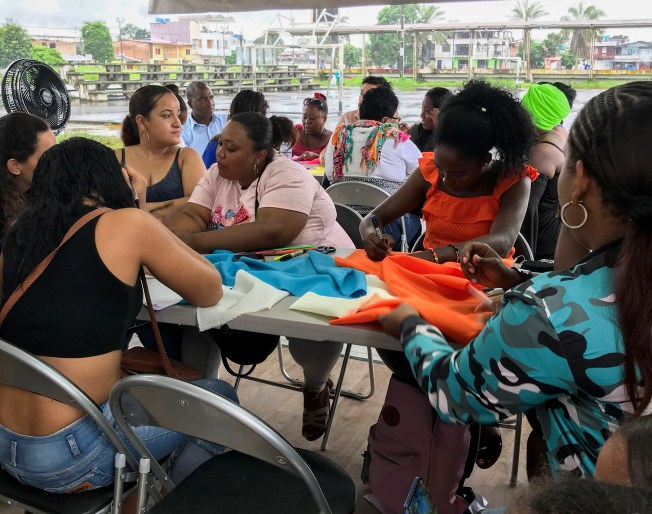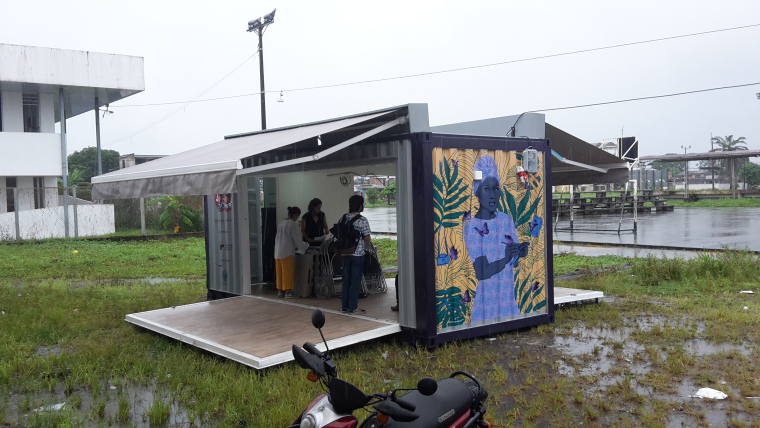Can the key to ending news blackouts in isolated areas of Colombia come from inside a shipping container?
The Bogotá-based Foundation for Press Freedom (FLIP) thinks so. In an experiment to turn community activists into reporters in regions that lack local news outlets, FLIP has converted a shipping container into a roving journalism classroom.
For much of the past year, the container has moved by truck from town to town in the Andes and along the steamy Pacific coast. Once the container is set up, journalism instructors gather inside with students who learn the basics of the craft–though since the coronavirus outbreak classes have temporarily moved online.
The idea for the workshop-on-wheels sprang from a 2019 FLIP report that describes local news deserts in 666 of Colombia’s 1,109 municipalities, which are the equivalent of U.S. counties.
In these areas, which are home to about 10 million Colombians–one-fifth of the country’s population–the report found no newspapers, websites, or TV and radio stations providing local news, mainly due to a long-running guerrilla war, threats against journalists from drug gangs, and the high cost of producing local content.
Even in isolated towns where there is news coverage, the FLIP report found that much of it comes from radio stations run by the Colombian military rather than from independent reporters.
“We had to figure out a way to break through the silence,” Jonathan Bock Ruíz, FLIP’s assistant director, told CPJ.
In reaching out to these regions, FLIP considered holding journalism seminars at hotel conference rooms or other sites in each town. But with the container, FLIP aims to create a more intimate environment and camaraderie among the students. The project was funded by the United Nations, with smaller amounts of funding from Open Society Foundations and USAID.
The container can be set up just about anywhere. Its metal walls flip up to form awnings to shelter people from the sun and rain. Inside is a whiteboard, audiovisual equipment, fans, a coffee maker, portable tables, and plastic chairs.
“It’s kind of cramped, but people feel like they have their own space and are more willing to speak up,” said Carolina Arteta Caballero, FLIP’s education director, told CPJ. She led a seminar in the Pacific coast town of Tumaco in March just before the coronavirus lockdown began.
During a visit by CPJ to Tumaco that month, the container was positioned in a clearing between a government office that provides aid to war victims and a cement basketball court with bent rims and broken backboards. Despite the dreary surroundings and a drenching rain during one of the March sessions, about two dozen Tumaco residents squeezed into the container.

Participants included one radio reporter but the rest were community leaders, some with children in tow. Lacking laptops, they took notes with pens and paper as Arteta covered everything from the basics of news writing to tips on detecting false news, a prevalent issue in Colombia.
“This is a way for me to learn how to communicate and express myself,” said one student, Silvia Ordoñez, who heads an environmental group that tries to protect the nearby Pacific coast mangroves.
The FLIP seminars are held in each town over seven consecutive weekends. The program focuses on community leaders because, Arteta said, they are often the most motivated and committed to improving living conditions in their towns and villages. Even after the students finish the course and the container moves to the next town, FLIP personnel in Bogotá remain in contact with the recent graduates and help them select and edit their stories.
At a time when major news organizations in Colombia are struggling, FLIP’s expectations are modest. Rather than founding newspapers or opening radio stations, course participants are, for the most part, taking their newly learned skills to social media.
The first FLIP seminars were held last year in towns in the western state of Tolima, a mountainous region that gave rise to the Marxist guerrilla group known as the FARC in 1964. Although the FARC disarmed in 2016, FLIP says that thanks, in part, to so many years of violence 20 of the state’s 47 municipalities have fallen into a local information vacuum.
Until recently in the hamlet of Puerto Saldaña, in Tolima, the only local information came from a man who walked the streets making announcements through a bullhorn, FLIP assistant director Bock told CPJ. Now, graduates of the FLIP program gather and post news on a Facebook page. To reach people with no internet connections, they also print out and attach their stories to a bulletin board in the town square on market days when Puerto Saldaña is filled with farmers.
After the FLIP seminars in the town of Cajamarca, a group of four female graduates, ranging in age from 20 to 65, began transmitting local news with a focus on women’s issues via videos on YouTube. Another student, 12-year-old Harrison Vargas, created a YouTube channel in which he promotes organic agriculture.
“He’s like a Colombian Greta Thunberg,” Bock told CPJ, referring to the teenage environmental activist from Sweden. “He wants to be the YouTuber who saves the countryside.”
Since mid-March, when the Colombian government announced a lockdown to prevent the spread of coronavirus, the container has returned to Bogotá and FLIP is holding its journalism seminars online.
But the concept of the container-classroom is to bring would-be journalists together and to create a sense of solidarity. That’s why Bock vows that once Colombia’s lockdown ends, “We’re going to get back on the road.”
[Reporting from Bogotá and Tumaco, Colombia]
